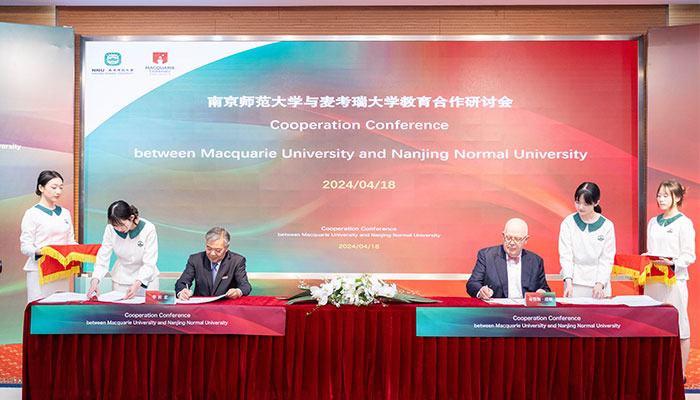Macquarie University is pleased to announce the launch of the Australian Research Council (ARC) Centre for Fruit Fly Biosecurity Innovation, dedicated to providing the Australian horticulture industries new, sustainable and environmentally friendly tools for controlling fruit fly pests and training a new generation of insect biosecurity researchers.
Fruit flies are Australia’s most economically damaging insect pests, posing significant threats to Australia’s $8 billion per annum horticulture industries. Insecticides have been used for decades to protect fruit and vegetable crops, but these are now restricted due to concern about consumer and environmental health, leaving horticulture industries vulnerable.
The Centre seeks to develop new approaches and tools to enable sustainable and safe control of these pest fruit flies and reduce industry reliance on hazardous synthetic insecticides.
“Fruit flies pose a serious risk to Australia’s horticultural sector, and sustained production of vulnerable crops will require new solutions for managing them,” said Centre Director Professor Phil Taylor.
“We need to find ways to control these pests without relying on synthetic insecticides, and without harming the environment or people.”
The Centre’s research focuses on the following key areas:
The Centre will directly support the research and training of ten PhD students and three Research Fellows in Insect Biosecurity, a discipline of great importance to sustainable production of fruit and vegetables in Australia, as well as protecting Australia’s borders from invasive species.
“With the help of the new PhD students and Research Fellows, we aim to contribute to solutions that will benefit not just the horticulture industries, but Australia’s food security, and to develop a knowledge and skill base that will have lasting impact,” added Professor Taylor.
The Centre will also provide a support network for dozens of research students, research fellows and scientists across Australia.
Based at Macquarie University, the ARC Centre for Fruit Fly Biosecurity Innovation brings together Australia’s leading fruit fly researchers from Macquarie University, University of Western Sydney, Queensland University of Technology, NSW Department of Primary Industries, the QLD Department of Agriculture and Fisheries, the CSIRO, the New Zealand Institute for Plant and Food Research, and Ecogrow Environmental Ltd.
The ARC Centre for Fruit Fly Biosecurity Innovation is supported by $3.7 million from the Australian Government through the ARC’s Industrial Transformation Training Centres scheme and $70,000 of supplementary support from the NSW Department Industry Research Attraction and Acceleration Program, as well as substantial contributions from each of the participating organisations.
Fruit flies are Australia’s most economically damaging insect pests, posing significant threats to Australia’s $8 billion per annum horticulture industries. Insecticides have been used for decades to protect fruit and vegetable crops, but these are now restricted due to concern about consumer and environmental health, leaving horticulture industries vulnerable.
The Centre seeks to develop new approaches and tools to enable sustainable and safe control of these pest fruit flies and reduce industry reliance on hazardous synthetic insecticides.
“Fruit flies pose a serious risk to Australia’s horticultural sector, and sustained production of vulnerable crops will require new solutions for managing them,” said Centre Director Professor Phil Taylor.
“We need to find ways to control these pests without relying on synthetic insecticides, and without harming the environment or people.”
The Centre’s research focuses on the following key areas:
- Finding out how fruit flies move in the environment to predict ‘hotspots’
- Developing tools to accurately and rapidly identify fruit flies, enabling a faster response
- Developing lures to attract flies to traps, isolating insecticides away from crops, people and non-target animals. This includes using developing lures based on pheromones used by fruit flies to find mates, and bacteria used to find food and hosts
- Investigating the cues fruit flies avoid, including products produced by predators such as spiders and ants, as a starting point to develop ways to protect crops by repelling rather than killing fruit flies
- Investigating the use of nematodes, fungi and bacteria for use in biopesticides for use against fruit flies. In particular, the team is investigating a bacteria passed from mother to offspring and can make fruit flies unable to reproduce, controlling the population.
The Centre will directly support the research and training of ten PhD students and three Research Fellows in Insect Biosecurity, a discipline of great importance to sustainable production of fruit and vegetables in Australia, as well as protecting Australia’s borders from invasive species.
“With the help of the new PhD students and Research Fellows, we aim to contribute to solutions that will benefit not just the horticulture industries, but Australia’s food security, and to develop a knowledge and skill base that will have lasting impact,” added Professor Taylor.
The Centre will also provide a support network for dozens of research students, research fellows and scientists across Australia.
Based at Macquarie University, the ARC Centre for Fruit Fly Biosecurity Innovation brings together Australia’s leading fruit fly researchers from Macquarie University, University of Western Sydney, Queensland University of Technology, NSW Department of Primary Industries, the QLD Department of Agriculture and Fisheries, the CSIRO, the New Zealand Institute for Plant and Food Research, and Ecogrow Environmental Ltd.
The ARC Centre for Fruit Fly Biosecurity Innovation is supported by $3.7 million from the Australian Government through the ARC’s Industrial Transformation Training Centres scheme and $70,000 of supplementary support from the NSW Department Industry Research Attraction and Acceleration Program, as well as substantial contributions from each of the participating organisations.



